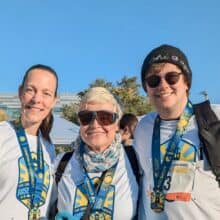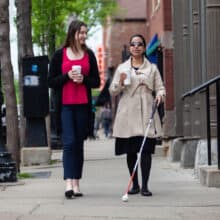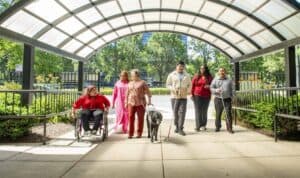Commentary: Is Blindness Really That Scary?
According to a recent survey, most Americans fear blindness. In fact, they fear it more than losing their hearing, speech, a limb or their memory. Nearly 88 percent of people surveyed considered having 20/20 vision vital to good overall health, while 47 percent believed that losing their sight would have the gravest effect on their daily lives. Loss of independence and quality of life were the top concerns for respondents. Over 60 percent were aware of common eye conditions like cataracts and glaucoma.
I have been blind practically all my life, so naturally, my first reaction would be to say that blindness is not as scary as it seems. Growing up as someone who is blind, I have no concept of what it is like to be able to see, and therefore I have successfully adapted to living without sight. Nevertheless, I realize how significant good vision is on people’s everyday lives – if anything, it is the sense used the most by human beings. I lost my sight as a toddler, but I am sure I would have had a much harder time adapting had I lost it as a teenager or adult, for instance.
I think the main reason why most people are so afraid of blindness is because of the tremendous lack of awareness about different ways to cope with vision loss. Today more than ever before, numerous resources and equipment are available to help individuals with vision loss live happy and rich lives. Organizations like The Chicago Lighthouse offer a wide array of programs, services and technologies that allow people with varying levels of vision loss to remain independent. Furthermore, research is constantly being done to both find cures for eye disease, and to help those affected by low vision to better live with their visual impairment.
These findings are not new or surprising – living in darkness is a natural fear humans have had for centuries. This survey only underscores the importance of doing further research on eye diseases, as well as providing more services and resources for people living with vision loss. Unfortunately, many individuals will have to confront this fear in the near future, because the number of people with vision loss in the United States is expected to double by 2050. Although not all forms of vision loss can be prevented or avoided, people can start by taking a few simple steps that will help them keep their eyes healthy in the long run.
For me, losing my memory or being diagnosed with cancer are my worst fears. As someone who has successfully adapted to vision loss, I know that there are excellent resources, services and adaptations out there that can make it easier to live life without sight. There’s no doubt that blindness can present challenges and inconveniences in our everyday lives, but thanks to the countless services and resources available in the United States, it is possible for people with vision loss – like me – to lead equally fulfilling lives. Most of the fears and misconceptions about blindness and visual impairments are surmountable, and we should all work to help people understand that losing one’s sight does not have to mean losing independence.





